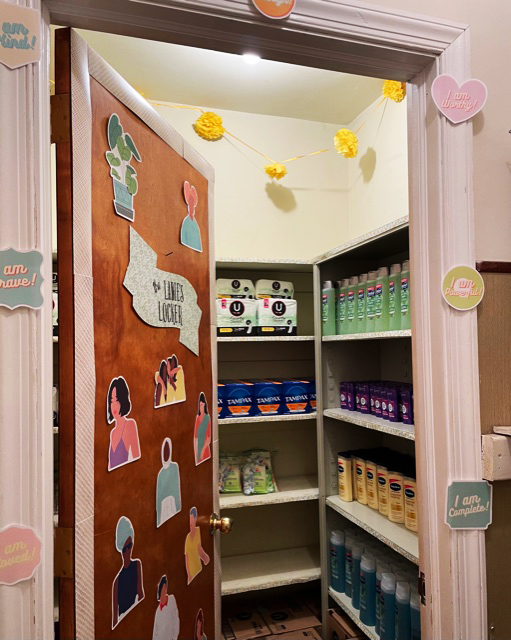
Mary Grace Dempsey, a senior at Merion Mercy High School, collected feminine hygiene products to help archdiocesan Catholic Social Services counter “period poverty,” a threat to women’s physical and mental well-being. (Mary Grace Dempsey)
A Catholic school student is “living mercy” by helping impoverished women receive basic necessities.
Mary Grace Dempsey, a senior at Merion Mercy Academy, recently wrapped up a three-week donation drive to supply feminine hygiene products for clients of archdiocesan Catholic Social Services (CSS).
During February and March, Dempsey collected the items, along with monetary donations, at From the Top Studio of Dance in Newtown Square, where she is also an instructor. In addition, Dempsey held an online campaign via the Venmo platform.
The teen said she undertook the initiative as part of her senior service project, entitled “Mercy Mystics,” which focused on applying her school’s motto of “live mercy, seek justice” to a particular issue.
Between pliés and ronds de jambe at the studio, Dempsey “received so many generous donations” that her bin was “filled to the very top,” while eliciting a few pirouettes of enthusiastic support, she said. “So many people expressed their love for this project and how important it is.”
For millions of women throughout the world, “period poverty” – the inability to afford or access menstrual products – is all too real.
Lack of income, supply chain issues, price increases and stigma surrounding menstruation combine to prevent teens and women from obtaining products often regarded, from an economic policy perspective, as non-essential.
[hotblock]
CSS has been steadily working to counter such deficits through its “Take Back the Month” donation drive, along with its Ladies Lockers, where feminine products are neatly displayed with messages of encouragement at a number of CSS sites, including Mercy Hospice, McAuley House, Women of Hope, Visitation Homes, Mercy Café, the Chester City Coffee Club and CSS family service centers across the five-county Philadelphia area.
“We distributed 1,652 feminine hygiene products last year,” said Amy Stoner, director of CSS’s community-based and homelessness services. “The number jumps to 8,372 when you include personal care products.”
Dempsey’s donations are “a great blessing” that will help CSS address widespread need, Stoner said.
In 27 U.S. states, feminine hygiene items are still subject to tax, and in most states, ineligible for purchase through federal benefits such as SNAP (Supplemental Nutrition Assistance Program) and WIC (Special Supplemental Nutrition Program for Women, Infants, and Children). Federal prisons only began providing menstrual products free of charge as of 2017; many state and local prisons still require inmates to pay.
With pad or tampon changes required every few hours, feminine hygiene costs can easily add up. At current prices, and given the 40-year average length of regular menstruation cycles, a woman can spend well over $6,000 in feminine care during her lifetime.

A brightly decorated “Ladies Locker” is seen at the archdiocesan Catholic Social Services (CSS) Northeast Family Service Center in Philadelphia. (Beth Wood)
Overextending the use of feminine hygiene products, particularly tampons, places women at risk for toxic shock syndrome, while negatively impacting mental and emotional health.
Stoner lauded Dempsey for doing “an amazing job of raising awareness” about period poverty, while “bringing other women together” to counter it.
Dempsey said the project was a chance to right a wrong.
“It’s so unfair that women are not able to (get) the products they need,” she said. “It’s not a choice; it’s natural, and the fact that some people can’t have the bare necessities for their period is terrible.”
Knowing she has helped to alleviate some of that suffering has been rewarding, she said.
“I am filled with so much joy and love after holding this fundraiser,” said Dempsey.
PREVIOUS: St. Mark Church, Bristol gets facelift for Holy Week
NEXT: Faith and friendly competition make everyone a winner at ‘Religion Bee’



Share this story